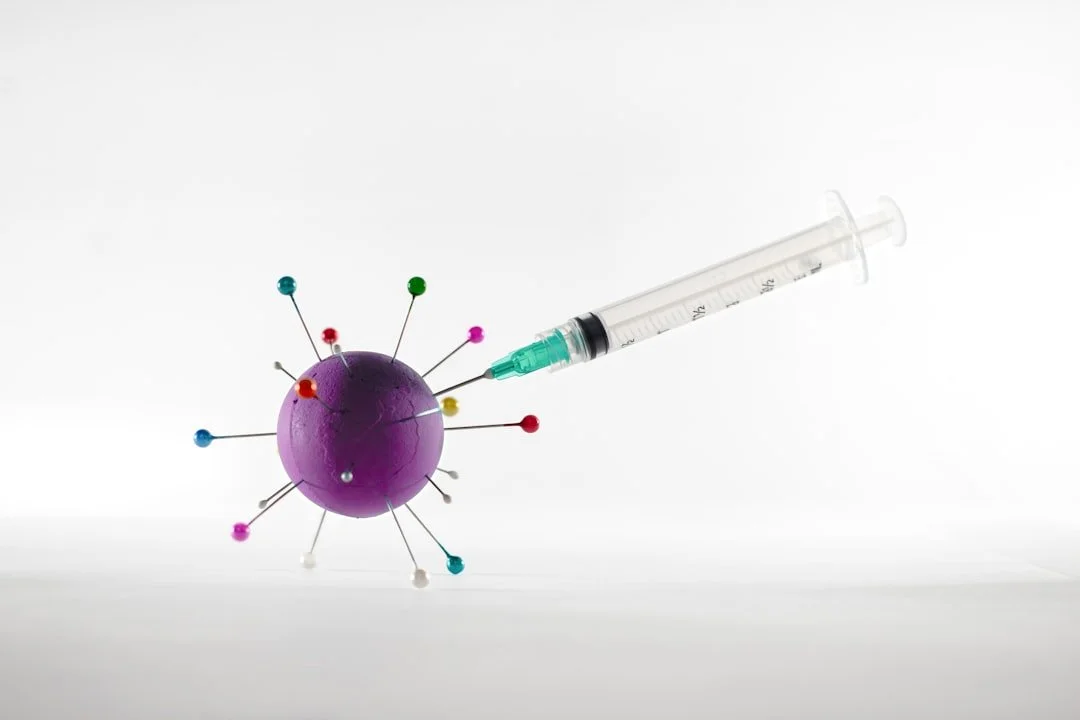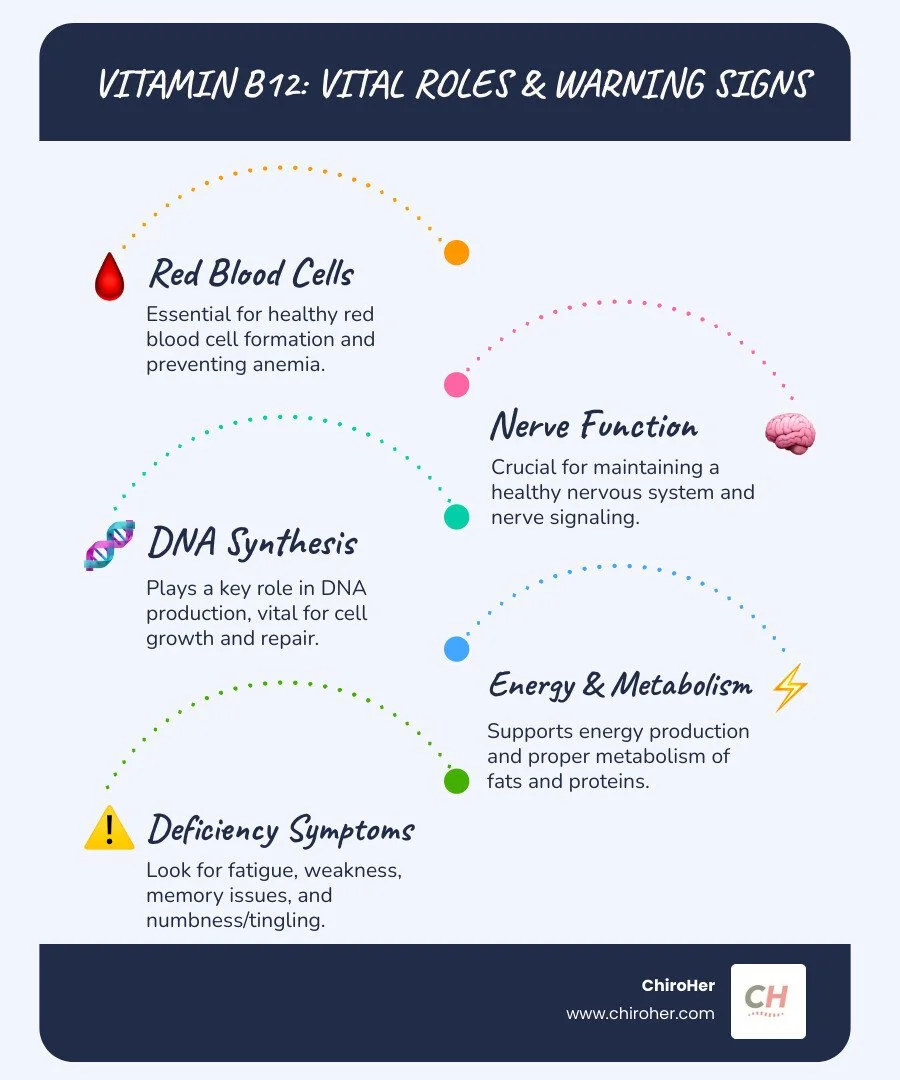The B12 Shot: What Every Human Needs to Know About Injectable Vitamin B12
An Introduction to Injectable B12
Injectable b12 for humans is a medical treatment that delivers vitamin B12 directly into muscle tissue, bypassing the digestive system for maximum absorption. Here's what you need to know:
Key Facts About Injectable B12:
Used to treat vitamin B12 deficiency when oral supplements aren't effective
Administered intramuscularly (into the muscle) by healthcare providers
Contains synthetic vitamin B12 (cyanocobalamin or methylcobalamin)
Provides rapid absorption for those with malabsorption issues
Requires prescription and medical supervision
Not recommended for general energy or weight loss in healthy individuals
If you've been experiencing unexplained fatigue, memory issues, or tingling in your hands and feet, you might be dealing with a B12 deficiency. Research shows that untreated vitamin B12 deficiency can lead to anemia or irreversible nerve damage, making proper diagnosis and treatment crucial.
Many busy professionals and moms in Oklahoma City struggle with these symptoms without realizing they could be linked to B12 deficiency. As people age, they sometimes have trouble absorbing vitamin B12, even when taking pills by mouth, which is when vitamin B12 injections may be considered.
I'm Dr. Michelle Andrews, founder of ChiroHer, and I've helped hundreds of patients understand their health needs, including when injectable b12 for humans might be the right solution. Through my practice, I've seen how proper B12 levels can transform a patient's energy and overall well-being.
Understanding Vitamin B12 and Deficiency
Vitamin B12 is an essential nutrient that plays a critical role in keeping the body functioning correctly. Let's explore its importance and why some people require injectable B12 for humans.
What is Vitamin B12 and Why is it Important?
Vitamin B12, also called cobalamin, is a water-soluble vitamin. It acts as a key regulator for many bodily processes. This nutrient handles several important jobs, such as cell reproduction, protein synthesis, and maintaining brain health.
Your body relies on B12 for:
Forming healthy red blood cells, which carry oxygen to every part of you.
Helping with DNA synthesis, the instruction manual for all your cells.
Keeping your energy metabolism running efficiently.
However, your body cannot produce vitamin B12 on its own. We have to get it from dietary sources, mainly animal products like meat, fish, eggs, and dairy. If you're vegetarian or vegan, fortified foods are an important source for getting enough B12.
A challenge with this vitamin is that some people can eat plenty of B12-rich foods but still can't absorb it properly. That's where treatments like injectable B12 for humans come into play. For more detailed scientific research on B12, the National Institutes of Health offers excellent resources.
What are the Symptoms of a B12 Deficiency?
The onset of B12 deficiency can be subtle, often starting with symptoms that mimic everyday stress or fatigue. Many patients initially dismiss these signs, attributing them to a busy lifestyle.
Fatigue is usually the first red flag. This is not ordinary tiredness, but a profound weakness that persists despite adequate rest.
The neurological symptoms can be particularly concerning. Numbness or tingling (often described as pins and needles) typically shows up in your hands and feet first. Some people also experience memory issues and trouble concentrating, which we sometimes call brain fog.
Mood changes are another common sign. B12 deficiency can make you feel unusually irritable, anxious, or down. Dizziness and balance problems might also develop as the deficiency progresses.
In more severe cases, you might develop megaloblastic anemia, a condition where your red blood cells become abnormally large and can't carry oxygen effectively. This makes the fatigue and weakness even worse.
Common B12 deficiency symptoms include:
Persistent fatigue and weakness
Tingling or numbness in hands and feet
Memory problems and difficulty concentrating
Mood changes like irritability or depression
Dizziness and balance issues
Pale skin or yellowing of eyes
Sore, red tongue
Who is Most at Risk for B12 Deficiency?
Some people have a much higher chance of developing B12 deficiency, and understanding these risk factors helps us catch problems early.
Older adults are at a higher risk. As we age, our stomachs produce less acid, which makes it harder to absorb B12 from food. Even if you're eating plenty of meat and dairy, your body might not be getting what it needs.
Vegans and vegetarians are naturally at higher risk since B12 comes mainly from animal products. If you follow a plant-based diet, you'll likely need fortified foods or supplements to maintain healthy levels.
People with pernicious anemia have a particularly serious problem. This autoimmune condition attacks the intrinsic factor, a protein your stomach makes that's required for B12 absorption. Without intrinsic factor, oral supplements won't work, making injectable B12 for humans often necessary.
Gastrointestinal surgery can also affect B12 absorption. Weight loss surgery, in particular, reduces your stomach's ability to process this vitamin. Digestive conditions like Crohn's disease and celiac disease create similar absorption problems.
Certain medications can interfere with B12 levels too. Metformin, commonly prescribed for diabetes, and proton pump inhibitors used for acid reflux can both reduce B12 absorption over time.
If you fall into any of these categories, it's worth discussing B12 testing with your healthcare provider. Early detection makes treatment much more effective.
Injectable B12 for Humans: What You Need to Know
When oral supplements just aren't enough, injectable B12 steps in as a highly effective solution. Let's explore how these injections work and what they can do for us.
How Do B12 Injections Work?
The effectiveness of injectable B12 for humans lies in its direct approach. When you take a B12 pill, it has to travel through your digestive system. It relies on a protein called intrinsic factor in your stomach to be absorbed. For many people, especially those with certain health conditions, this process doesn't work well.
Injectable B12 bypasses this digestive process. These shots are typically given right into a muscle, like your upper arm or thigh. This means the Vitamin B12 goes straight into your bloodstream. It becomes readily available for the body to use. This direct route makes it incredibly effective, especially for anyone who struggles with absorbing B12 through their gut, such as those with pernicious anemia.
This direct delivery helps your body's cells get the B12 they need quickly and easily. It supports so many vital tasks, like making healthy red blood cells, building DNA, and maintaining nerve health.
You might hear about different kinds of B12 used in injections. The most common one is cyanocobalamin. This is a man-made version of Vitamin B12, and it is effective for most people, helping with blood cell formation just like the natural kind. Another important type is methylcobalamin, which is an active form of the vitamin. Both are effective, but it is essential to provide your healthcare provider with your full medical history. For example, cyanocobalamin can be risky for people with a condition called Leber's disease, as it might harm the optic nerve. This ensures you receive the safest, most effective treatment.
What Are the Benefits and Risks of Injectable B12?
For those truly low on B12, getting injectable B12 for humans can be transformative. When your B12 levels are corrected, you might notice some significant improvements:
A boost in energy. If you've been feeling constantly run down, even after a good night's sleep, B12 injections can significantly reduce that tiredness and restore your energy levels.
An improved mood. Patients often report feeling less irritable or anxious, and even finding relief from symptoms of depression linked to their deficiency.
Better cognitive function. You might experience clearer thinking, sharper memory, and an easier time focusing. That frustrating 'brain fog' many people experience can lift.
Nerve health support. For those dealing with nerve issues like numbness or tingling, B12 injections can help ease those discomforts.
Healthy red blood cell formation. By correcting conditions like megaloblastic anemia, these injections ensure your body has plenty of healthy red blood cells to carry oxygen where it needs to go.
Now, while injectable B12 is generally very safe, it is important to be aware of potential side effects. You might have some mild side effects right where the shot was given, like mild pain, swelling, or itching. These usually go away quickly. Some people might also notice mild diarrhea or a feeling of swelling in their body, but these are typically temporary.
Very rarely, more serious reactions can occur, such as a severe allergic reaction. Your healthcare provider will always discuss these rare possibilities with you. It's also important to remember that if you have Leber's disease, a specific type of B12 called cyanocobalamin could be harmful to your optic nerve. And if you're allergic to cobalt, B12 injections aren't for you. Always share your full health history with your provider.
One very important point: injectable B12 is primarily a medical treatment for a diagnosed deficiency. While some places might market it for general energy boosts or weight loss, if your B12 levels are already normal, there's little scientific proof that these injections will give you a significant energy rush or help you lose weight. We believe in care based on solid evidence. If you're not deficient, these injections are unlikely to be the 'magic bullet' you're looking for. To learn more about vitamin injections in general, read our blog post on vitamin injections.
How Do I Know If I Need a B12 Injection?
The most important first step to find out if you need injectable B12 for humans is to talk with a healthcare provider. It is critical to not self-diagnose a B12 deficiency or self-administer injections. Always seek professional guidance.
When you come in for a consultation at ChiroHer, we'll take a thorough approach to understand your needs. We'll start by discussing your symptoms in detail. We will ask about any persistent tiredness, unusual nerve sensations, memory issues, or mood changes. Then, we'll review your medical history, looking at things like your diet (especially if you're vegan or vegetarian), your age, any stomach or gut conditions, past surgeries, and even the medicines you take, like metformin or proton pump inhibitors, which can sometimes affect B12 levels.
The clearest way to know is through diagnostic tests. A simple blood test can tell us exactly what your Vitamin B12 levels are. This is how we get a clear diagnosis. Catching a B12 deficiency early is so important, as untreated low B12 can lead to anemia or even lasting nerve damage. Once we confirm a deficiency, we'll work with you to figure out what's causing it. Knowing the root cause helps us create the very best treatment plan for you. For example, if you have pernicious anemia, you might need injections for life.
When it comes to dosage and frequency, everyone is a little different. How often you need B12 injections depends on how severe your deficiency is and why you have it. At first, you might need shots more frequently, perhaps every day for a couple of weeks, until your symptoms start to improve. For ongoing care, especially if you have a chronic condition causing the deficiency, you might need maintenance shots, maybe every two months or even monthly. Vitamin B12 has a very low risk of toxicity, so there's really no upper limit to how much you can take without harm.
B12 shots are usually given into a muscle, like your upper arm or thigh. If you'll be giving yourself shots at home (after proper training from us, of course!), always use a new needle and syringe each time and dispose of them safely in a special sharps container.
Before you get an injection, and while you're receiving treatment, there are a few precautions to keep in mind. Always tell your doctor about all your current medicines, including any prescriptions, over-the-counter drugs, vitamins, and herbal products. It's also important to let us know if you have any allergies (especially to cobalt or B12), or if you have Leber's disease, kidney problems, or are pregnant or nursing. Also, try to limit alcohol consumption during your treatment, as it can interfere with B12 absorption.
Proper storage is key for your B12 injections. They should be kept at room temperature, away from moisture, heat, and especially light, as light can make the vitamin unstable. Some specific types, like methylcobalamin, might even need to be refrigerated.
At ChiroHer, we are committed to providing personalized care. If you're in Oklahoma City, Yukon, Edmond, Nichols Hills, Del City, Mustang, or Moore, and you think a B12 deficiency might be behind how you're feeling, please reach out. We are here to help you get answers and find the right path toward improved well-being. Schedule a consultation with us today.
This guide is for informational purposes and is not a substitute for already established medical advice from your healthcare provider.





